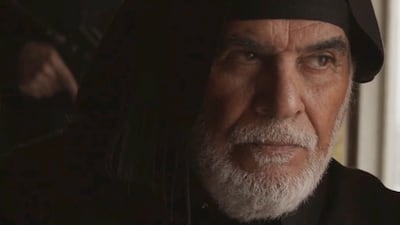An Oscar nomination is a dream come true for any young filmmaker.
But when Iraqi screenwriter and director Ahmed Aldaradji found out he was in the running for an award at the world's most prestigious film ceremony, a whirlwind of emotions gripped him.
This month, the Iraqi Ministry of Culture submitted his film Hanging Gardens for Best International Film at the 2024 Oscars in Los Angeles.
“It is my first time representing Iraq at this level,” Aldaradji, 36, told The National from London.
“It is a daunting task and huge responsibility. It feels like you bear the burden of this large country and that’s not an easy task,” he added.
The film is about two brothers, Asaad, 12, played by Hussain Muhammad Jalil, and Taha, played by Wissam Diyaa.
The pair work as rubbish pickers in Baghdad's dumps, referred to locally as the “Hanging Gardens”, where they scavenge the landfill for metal and plastic they can sell.
One day, Asaad discovers a human-size doll left behind by American soldiers. He names it Salwa and decides to keep it.
But when he brings to home, his brother Taha assaults him, thinking that the doll will ultimately ruin their reputation. Asaad goes back to the landfill to make a new home for himself and his discovery.
He finds himself caught between people who want to take Salwa for themselves, and those who want to destroy her.
The doll becomes a symbol of a child’s yearning for normality as well as a reflection of the many calamities that Baghdad has endured in previous decades, from dictatorial rule and US occupation to sectarian war and economic hardship.

Aldaradji said the driving force behind the film was the way Hollywood portrays Iraq and the 2003 US-led invasion that toppled Saddam Hussein’s regime, particularly in the 2014 film American Sniper.
“That American movie made me upset," he said.
"It is disgusting how the Americans portray their longing for war, they portray it as something sexy through a person with muscles killing people.
“Hanging Gardens is a reaction to what I saw.”
He said he wanted to show America that “the war is not beautiful and the Americans who arrived in tanks are not liberators”.
Aldaradji graduated from the University of Baghdad in 2008 before working as a director of photography, writer and director for Baghdad-based satellite stations and companies. In 2010, he moved to London where he obtained a master's degree in filmmaking at the London Film School.
Hanging Gardens premiered at the 2022 Venice Film Festival, after which it travelled to festivals in Sweden, South Korea, Saudi Arabia and Jordan. It recently screened at cinemas in Baghdad.
It won several awards, including Best Fiction Film, Best Screenplay and Best Actor at the 13th Malmo Arab Film Festival in 2023, following on from the Best Feature Film award at the 2022 Red Sea International Film Festival in Saudi Arabia.
Like many industries in Iraq, film was badly hit after the 2003 invasion. The country lost much of its film archives to looters and vandals. Cinemas closed, as people stayed away because of conflict.
But, in recent years, a new generation of young filmmakers is emerging despite hardships in securing financing and unrest.

Aldaradji said the nomination can “shed the light on the burgeoning cinema industry" and encourage other Iraqi filmmakers to follow in his path.
The 96th Academy Awards is to take place on March 10 2024 at the Dolby Theatre in Los Angeles.
Each country submits one film to the academy, with Iraq choosing Hanging Gardens.
As part of a long process, each nominated film must be screened in the US in order to receive votes from members of the Academy of Motion Picture Arts and Sciences.
Mr Aldaradji approached the office of Prime Minister Mohammed Shia Al Sudani to request $60,000 in funding for his campaign, the minimum amount required. His request was rejected, citing lack of funds.
“I’m still looking for funds and knocking the doors,” he said.
He experienced some of the horrific violence that engulfed the country after 2003.
During the sectarian war, he was kidnapped twice by Sunni and Shiite militias who were fighting each other. He was also arrested by the US forces for 10 days for holding a camera and filming in Baghdad.
For him, Iraq is in a period of significant change and development similar to the challenges and transitions faced during adolescence.
“I’m optimistic about Iraq, but that optimism is tinged with fear and doubt,” he said.
“For me, Iraq is still a teenage country because the Americans put us at the zero stage in 2003 in terms of institutions.
“To reach maturity, you need to grow past 30 and reach 40 or 50, for your vision of life to be fully complete.”


